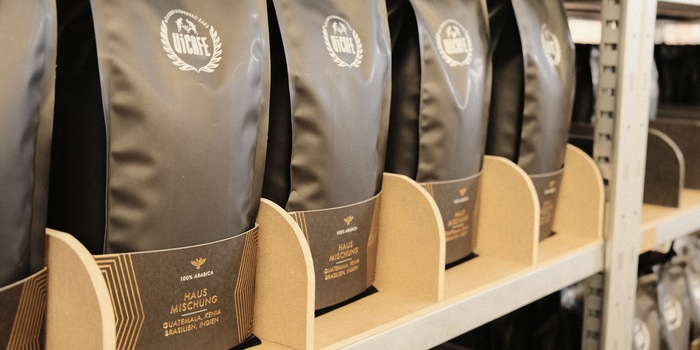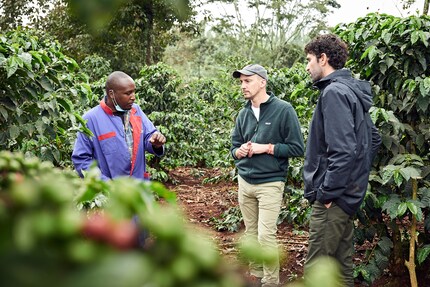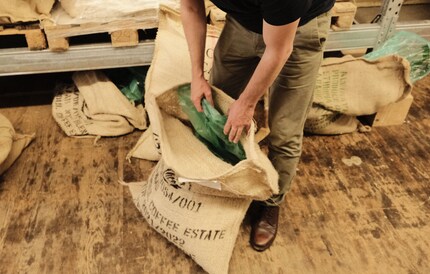
Promotion

Headlines such as this one first hit months ago: Your daily cup o’ Joe is about to cost you even more of your hard-earned quid. Why? Because of the price increases of raw materials on the world market. Manufacturers of cheap coffees in particular have had to raise prices. Here’s an in-depth look at how speculators, weather and bean quality have been determining coffee prices.
«Migros and Coop raise coffee prices,» SRF reported in January (German only). The price increase was justified by bad weather in Brazil. Less supply on the market means rising prices. Because the South American country is the largest coffee-growing region, the weather there has a decisive influence on the global coffee price.
If Brazil starts coughing, does that mean the world of coffee gets sick? Not quite; this metaphor is a little too simple for the reality of the coffee market. Time for me to get to the bottom of things. As a coffee snob, it’s not uncommon for me to pay 80 francs for a kilo of coffee at local roasters (comments that I’m insane can be made below). That way I know I’m getting the quality I’m paying for. Most roasters know the origin of their beans almost to the hectare. The situation is quite different in wholesale, where coffee is a commodity like gold, copper and zinc.
Pascal Herzog sounds like a banker when it comes to the price of coffee. When he talks about coffee as a product, you can feel the passion of a barista in the conversation. Pascal and I are in the stylishly furnished meeting room of Vicafe in Zurich, and he’s spouting terms such as «Fundamentals», «Futures» and «Arabica Coffee». He studied economics in St. Gallen and then got into the international coffee trade, which is where the banking jargon comes from. Today he’s a member of the management team at Vicafe, and is also responsible for purchasing beans. «The weather in Brazil is certainly decisive for the price of Arabica coffee. But the economic situation and currency are just as key,» says Herzog.
All these external influences determine the global stock market price for coffee of the Arabica variety, which in turn is used to determine the prices of its various grades. These are of particular interest to large importers, food multinationals and speculators, who don’t make the world market, fair wages or sustainable agriculture a priority. These players also include the retailers mentioned in the SRF report, who offer their coffee for so cheap that they can’t cushion price fluctuations. The math is simple: if the purchase cost of the beans is almost as much as the final product, there will be nothing left at the end, as can happen with mass suppliers. And the assumption that the producers still earn any profit at all from the coffee is not necessarily true.

Labels such as «Max Havelaar» give consumers a certain assurance that labourers are paid a fair price; coffee farmers receive more money from such a brand than those without the label. The approach of Vicafe and other small roasters, which buy directly from farms, is even «fairer».
«For Vicafe, the stock market price plays almost no role», explains Pascal Herzog. He still does business the way it used to be done. «We go to the farmers and ask what price they have to have for their beans. Then we go to the exporters and ask them the same question and so on. For example, the farmer says he needs $3 a pound, the exporter 20 cents, and then the importer another 20 cents, so that’s how we come up with the final price for the green, unprocessed coffee beans that we then roast, package, and market.» A price that is higher than the exchange price in any case. «That’s called an outright price. We don’t buy the coffee on the stock market or through auctions like the big traders do.»
Nevertheless, the stock market price plays a role in direct contact, Pascal Herzog points out: «If all Colombian coffees suddenly become more and more expensive, then our coffee farmer Oscar in Colombia will naturally demand more money from us. If we don’t pay that, he’ll just look for other partners who will pay the normal Colombian price.»
So Vicafe would also have to raise the price of their coffees. Pascal Herzog explains that an unconventional model was chosen: «We don’t do it by percentage of margin, but by a fixed margin. That is, instead of a percentage margin, we take a fixed number of francs per kilo. This way, we don’t take advantage of rising bean prices, and the price doesn’t increase as much for customers.» Pascal explains the strategy in this video (in Swiss German).
The reason for the price increase is also the contracts that Vicafe makes with its partners. These aren’t long-term contracts but deals made with a handshake. Vicafe can still carry out its operations at the end of the day because these deals are for the medium term; the negotiated price is valid for a year or longer. That way, farmers can cover their operating costs, which include fair wages, rent, and equipment and farm maintenance. If the current stock market price fluctuates, there’s less of a problem because the operating costs are covered.
Sounds like a win-win, without the risk. Is it too good to be true? Pascal laughs: «Of course there are risks with our business model. When a crop fails due to environmental factors such as disease or weather, we have little time to look for alternative suppliers. In wholesale, it doesn’t matter if one of your thousand suppliers has a bad harvest. For us, it makes a difference.» Fortunately, this rarely happens but, worst comes to worst, the popular house blend can be bridged for half a year with the green coffee that’s in stock. It would be more difficult with speciality coffee – our warehouse could be empty after a few weeks.
We moved from the meeting room to storage. In an old SBB workshop, green coffee is stacked by the sack, and in one corner the roasting machine is humming. «For us, sustainability doesn’t stop at the bean,» says Vicafe Managing Director Ramon Schalch, showing me a small 30-kilo coffee sack. «This is a pilot project in Tanzania, where we’re switching from 60-kilo sacks to 30-kilo sacks. This takes the strain off the shipping company because people only have to carry half as much weight,» Schalch explains. «In addition, everything is made locally instead of imported from overseas. Even for the plastic aroma protection bags inside the sisal bags, we found a local solution at a factory that usually makes mosquito nets.»

This is how Vicafe is supporting local business, beyond the coffee farmers. «I think we can say only very few roasters do this so consistently,» adds Pascal Herzog. There’s no trace of the banker now, only the coffee lover with a heart for people and their coffee farms.
When I flew the family nest over 15 years ago, I suddenly had to cook for myself. But it wasn’t long until this necessity became a virtue. Today, rattling those pots and pans is a fundamental part of my life. I’m a true foodie and devour everything from junk food to star-awarded cuisine. Literally. I eat way too fast.
Interesting facts about products, behind-the-scenes looks at manufacturers and deep-dives on interesting people.
Show all